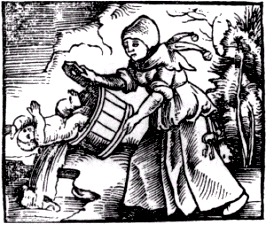No Rice At The Lord’s Wedding? — Part 1
You’d think she had written an enormous essay declaring her exit from Christianity’s stage.
But author Anne Rice’s July 28 announcement, posted on her Facebook wall, was short enough to quote here almost entirely.
Today I quit being a Christian. I’m out. I remain committed to Christ as always but not to being “Christian” or to being part of Christianity. It’s simply impossible for me to “belong” to this quarrelsome, hostile, disputatious, and deservedly infamous group. For ten years, I’ve tried. I’ve failed. I’m an outsider. My conscience will allow nothing else.
And her followup, posted just minutes later, outlined some of the reasons for her frustration:
I quit being a Christian. I’m out. In the name of Christ, I refuse to be anti-gay. I refuse to be anti-feminist. I refuse to be anti-artificial birth control. I refuse to be anti-Democrat. I refuse to be anti-secular humanism. I refuse to be anti-science. I refuse to be anti-life. In the name of Christ, I quit Christianity and being Christian. Amen.
 Either way, it was a very public exit. And it caused plenty of public acclaim, with some sporadic outrage. Rice herself posted many of them to her own fan page. Of course there were the usual threats that she’s surely going to Hell, but the author also posted several more-gentle rebuttals.
Either way, it was a very public exit. And it caused plenty of public acclaim, with some sporadic outrage. Rice herself posted many of them to her own fan page. Of course there were the usual threats that she’s surely going to Hell, but the author also posted several more-gentle rebuttals.
I understand the whole I’m-fed-up-with-the-Church part. Most Christians do; most have also been there. Still, except for the “anti-life” part, Rice’s exit seemed directly to stage left.
That’s another topic, though closely related.
Instead, my first question is not just for her, but for any professing Christians who say they follow Jesus, but can’t stand “organized religion.” And, though we know false believers are plentiful, Church critics imply they dislike all other true followers He has called to His Church:
“Why do you call me ‘Lord, Lord,’ and not do what I tell you?” (Luke 6:46).
(My second question: what can Christian artists and authors learn from Rice’s story thus far?)
Why not do what He says?
Author/blogger Mike Duran beat me to this point earlier today. Responding to Rice, he asked:
Frankly, I’m not sure where all these anti-everything folks are. They’re not at my church. Or the churches I know. […] So what “Christianity” is Anne Rice quitting? […] I just get so tired of these broadbrush, wholesale condemnations of Christianity based on extremists and fringe positions. And isn’t that what the “Follow Christ / Quit Christianity” folks do? They portray a caricature and then reject it.
And I’m still left wondering how exactly one can claim to love Christ and not do what He says.
The fringe types, the Westboro “Baptist” sign-wavers, the gay-beaters and others — they’re already not doing what He says. So how, exactly, does throwing out more of the Word help?
Absolutely, “Christians” are jerks. Those who use their faith as a means to their own favorite ends — and the Bible only as a Life Instruction Manual for how to change society, oppose actual or real evils, or ignore their own sin shrapnel — are guilty of idolatry. Few Christians would deny that they have also been guilty of being more anti-this-or-that than they are pro-God, as He has revealed Himself, and pro-Gospel — the only way we can be saved from sin.
“My glory I will not give to another,” God proclaims (Isaiah 48:11).
True Christians should want Him personally, for His own infinite, loving and holy Self. We must fight remnant impulses to use Him and His gifts for our own goals. Scripture is clear about that.
But how is it any different to claim that it is more important to be anti-anti-humanist, anti-anti-gay, anti-anti-feminist, or whatever? People on either “side” fail to base their faith on being pro-God. Either side is guilty of using Jesus is a means not to Himself, but Fixing a Problem.
Either side is also guilty of promoting Religion over Relationship.
For a real relationship, one must know something about the other person. And if the Person is actually the God-Man Himself, to Whom we owe all fear as well as love and gratitude, those who claim to love Him should want to know as much about Him as we can. That includes the “liberal” parts and the “conservative” parts, the “tolerant” parts and the judgmental parts.
Rice seems to understand that, at least in part. I base this on her July 29 post, in which she quotes from Matthew 10 about following Jesus causing strain in human families.
Yet the very same Jesus also observed that God created marriage to be between a man and a woman. Quoting from Genesis 2, which describes God’s creation of Adam and Eve and the institution of marriage, Jesus upheld the what of marriage (Matthew 19: 1-8).
That same day, the author reminded her readers of wise words from the Apostle Paul: any Christian, including himself, could have all the spiritual gifts in the world (real or hypothetical) yet they are useless without love (1 Corinthians 13). But that same Paul, inspired by the Holy Spirit, had hard things to say about homosexuals (Romans 1). Even better, he revealed God’s mysterious why behind human marriage: to show Christ’s love for His Church (Ephesians 5).
I sympathize with anyone who may have honestly only seen Christian activists acting as though their political work, and not God Himself by His grace, is the world’s only hope from societal collapse. And I’ll say this as carefully as I can: many professing Christians, including the Catholic Church, have not done the best of jobs in the world saying why Christians defend marriage. It is not to Preserve Society or Uphold Tradition. It’s to show the world what Jesus’ love for His Bride is like, and what His Bride’s love for Him should be like.
Apparently Rice has not seen this. She says she wants Jesus, but she can’t stand His wife.
Curious Christians wonder if she really has met His actual wife. I’m forced to wonder also if she has ever met Himself. Only the end of the story will let us know for sure.
But from what I’ve read from her, I’d sure like to think she will still attend His wedding.
Next: What can Christian artists and authors learn from Rice’s story thus far?








































I’ll be honest with you; If I thought it was that easy, I would have left years ago.
But sadly I am still in love with the Groom, and He hasn’t shown me a better way to do it yet that doesn’t involve loving His Bride as well.
<
I am looking forward to reading that.
Okay, I just realised that sounded like a spam comment. What I meant was that as a Christian writer I am looking forward to the next in the series.
(See, I am a real person)
D7
Well, honestly this doesn’t surprise me too much, though it does disappoint me a bit. I seem to recall that Anne Rice rejected her faith for years (while she wrote her famous Vampire Chronicles) and then had this big ta-da when she returned and began writing her Christ the Lord series. Because of her public repentance (for that’s all I can think to call it) I want, as Stephen has said, to think she’ll be at the marriage supper. However, the Bible’s response to this is to “work out thy own salvation with fear and trembling.” I can’t say for certain anything about Ms. Rice’s salvific state, but I will be interested in further developments in this “plot” if you will.
Though I have not read either series, I recall reading an excerpt in World magazine, from her version of Jesus being tempted by Satan (Matthew 4). Though of course fictionalized, with some Artistic License, what she wrote — from what I can recall — was true to Scripture.
About “work out your own salvation with fear and trembling,” I always like to finish the sentence (from Philippians 2: 12-13) just to be safe! “… for it is God who works in you, both to will and to work for his good pleasure.”
And again, I hope that Rice is not, and was not, expecting any church members (Catholic or Protestant) to work out their salvation without knowing it is God working in His people Who truly does it. One should not expect the fruits of conversion without the roots of conversion: the Gospel of salvation from death and God’s just wrath, solely by the free gift of Christ, and by His blood and sacrifice.
I’m Catholic, and I see the Church as the bride of Christ, certainly, but also as a human institution, made up of us imperfect human beings. It strikes me that many people who leave the Church out of frustration are actually very good and idealistic, but have lost sight of the whole picture. Flannery O’Connor put it this way – I apologize for not knowing whom she is quoting; I think it may be St. Teresa?: “The Church is the cross on which Christ was crucified. You cannot have Christ without the cross.”
Mary, the quote from O’Connor and/or St. Teresa seems lost on me. Perhaps it’s a uniquely Catholic metaphor: how is the cross compared with the Church? To us — and I think that includes Protestants and Catholics — the Cross is a symbol of Christ’s death for His Church, suffering under God’s wrath in place of His people, the final sacrifice (as outlined in Hebrews). And when we see a cross shape, optimally, we think about Him and that moment. So if you stop by, help me understand what is meant by compared the Cross to the Church? ‘Twould help me learn. 😀
Otherwise, we’re in perfect agreement. And in response to those who leave the Church because it’s full of imperfect people (I refer to actual committed sins, such as unloving attitudes and cheapening the Gospel), I want to ask: do you really think it will be any better out in the world? If “organized religion” (assuming here faith based on truth) is bad, how much worse is it when it is disorganized!
Yet as I wrote above, thus far, almost all of what Rice has said seems a uniquely “left-wing” critique. I avoided talking about this, but Rice mostly cited attitudes that are either more common to fringe groups, or else beliefs that are actually Biblical (such as being “anti-humanist,” as in secular humanist).
Anyone has a better case if they are citing actual un-Biblical behavior, such as lack of Christlike love, compromising the Gospel, or treating human opinions about disputable matters (a la meat sacrificed to idols, Romans 14) as Gospel.
I’ve been in many churches, with my family while I was still living at home, and have been a part of leaving several of them. Still, this does not qualify as having left the Church proper, or even a local church — an organization that does not act according to clear Biblical standards for faith and practice is not a church.
In my next column (next week), I’ll try to avoid the debates over whether Rice has left a church-that-isn’t-really, or whether this means she’s no longer a Christian. Scripture is clear that sanctification is a process. What will prove the truth one way or the other is whether the Lord draws her to Himself — whether that is drawing her back to where she was with an initial repentance and faith, or drawing her for the first time. We’ll only know for sure if we see her at the banquet table, when she’s not only attending the wedding of the Lamb and His Bride, but actually part of the bride. And what a celebration that will be!
[…] more discussion triggered by Ann Rice's decision, read "No Rice at the Lord's Wedding?—Part 1" over at Spec Faith's new […]
[…] up from last week’s column, I also must wonder if novelist Anne Rice is […]